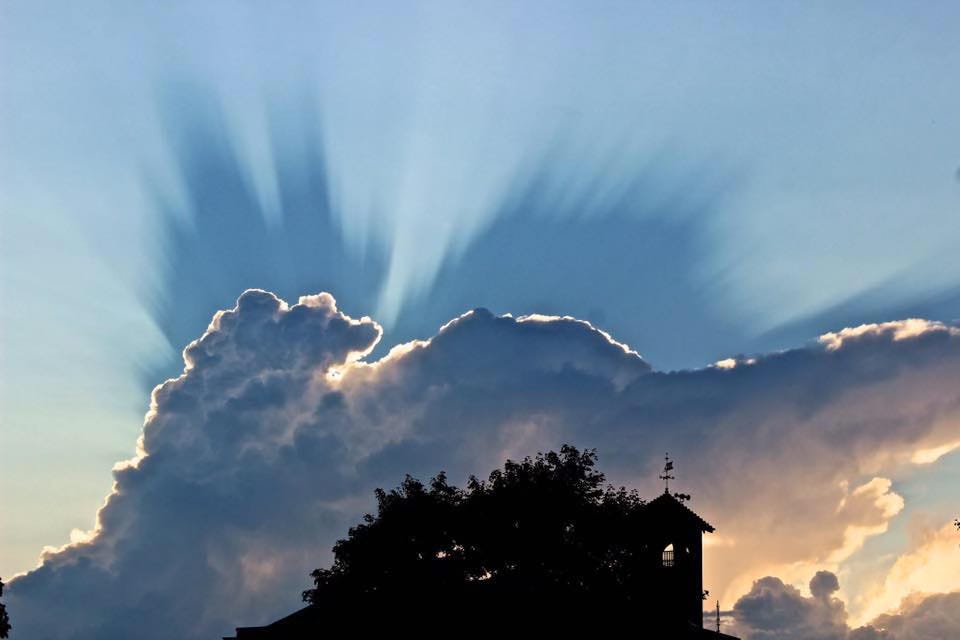Sometimes we go for a long drive at dusk. My wife takes the wheel—it relaxes her, she says—and I take pictures out the window with my phone, hoping to catch an essence of evening coming on: hay barns shot through with sunlight; a peach orchard in blossom. Later, I’ll spam my social media feeds with images, offering captions like: “Right now,” “Evening,” “Last Light.” I have no delusions about being a photographer. My wife doesn’t even stop the car.
The drives began out of the necessity to get our toddler to sleep. They continue, I think, out of a kind of emotional inertia. It’s something we’ve always done. It’s us. Our little boy has grown up on these drives. Now he’s a teen, reading books in back and looking up occasionally to ask the meaning of a word.
We live in a small town in eastern Massachusetts, half an hour and a world away from Boston. Out the window farms blur by, their names suggestive of a dreamy aesthetic: Idyllvale, SpringDell, Spring Brook, Old Frog Pond, Doe Orchards. Stone fences crisscross the woods, marking obscure boundaries. Mill ponds sparkle. High on the hillsides at dusk, as though of one mind, pines trees shimmy off the day’s last light like a gold dress.
At the town lookout point we catch a glimpse of the sloping curve of Mount Wachusett, and, farther off, across the border into New Hampshire, the stark and mysterious Mount Monadnock. It was here, in 1843, Bronson Alcott—Louisa May’s father—founded Fruitlands, a transcendentalist colony. Residents kept a strict vegan diet, took cold baths every morning, refused the use of animal labor in their agriculture. Eschewing cotton due to its reliance on enslavement as a means of production, they dressed themselves in linen.
Down these same winding country lanes, our son is three, four, five, six, seven years old, older every day, eight, nine, ten, eleven, twelve, thirteen. We lose him a little more every night. We gain him back.
Now teenagers own this spot. On Friday nights they cram themselves into the beds of pickup trucks and sit on the roofs of their cars, watching the sunset. They take selfies under a glowing sky. They smoke cigarettes. They kiss. They have no idea how young they are and that none of this lasts. I am tempted to envy them, but when we roll by—when they turn to look at us, hungry-eyed and expectant—I recall the loneliness of my own teen years, how I looked everywhere for evidence of who I was, desperate for anyone to please tell me. No envying them that.
Or maybe that’s just a story I tell myself. My life now revolves around the demands of adulthood: work, parenting, budgets to balance, a never-ending stream of dishes and laundry, the time- and money-suck of homeownership. There are crises to keep up with—war, disease, climate change, four more years of Trump. The leaves still need raked, the snow shoveled. My fifty-year-old’s body speaks to me in a series of slow aches and ailments.
Where have the years gone? Down these same winding country lanes, our son is three, four, five, six, seven years old, older every day—eight, nine, ten, eleven, twelve, thirteen. We lose him a little more every night. I sometimes sneak a picture of him, reading his book, sunlight slanting across his knees.
“What are you doing?” he says.
“Nothing,” I say.
“Don’t take my picture.”
We are not the only nightly drivers out and about. For years we have seen the same old brown station wagon. From my internet sleuthing, I have deduced it’s a 1977 Dodge Aspen, the sensible shoe of a bygone automotive era.
The driver is a middle-aged Asian man, and in the passenger seat, a wan figure—likely his mother—stares straight ahead out the windshield. We don’t imagine they recognize us. Many cars like ours drive these roads, but there’s only one brown 1977 Dodge Aspen. From time to time, we consider flagging them down and attempting to explain how catching a glimpse of them always makes our night. But we always decide against it. That we share something in common with these strangers—a feeling for the landscape, for the evening hours, for the idleness of a drive through the country—is enough. To ask anything more risks breaking the spell. If we got to know them, we’d lose how it felt to wonder.
Which I suppose is just how it is: children grow up, adults get old. Every arrival is also a point of departure. Better to leave well enough alone.
On our nightly drives, we don’t ever turn and head for home intentionally—it’s more of a drift that sets in, a gravitational pull in that direction. Too dark for good pictures, I put away my phone and start thinking about the dishes in the sink, about what work I have tomorrow and if I’ll need to iron a shirt.
“Watch for deer,” my wife says.
“I am,” I say.
Sometimes on the horizon, at the very end of the day, a slash of light slips out from under the clouds, pink and slanting across the fields. Sometimes I’ll see a deer look up as we pass.






"Down these same winding country lanes, our son is three, four, five, six, seven years old, older every day, eight, nine, ten, eleven, twelve, thirteen. We lose him a little more every night. We gain him back. "
Every night, we and those we love, disappear into something infinite, and then return in the morning, mostly recognizable, but undeniably changed to one degree or amother.
I couldn’t stop reading, or listening, rather, as if you were telling this story over coffee or another drink. And loved the photo too.